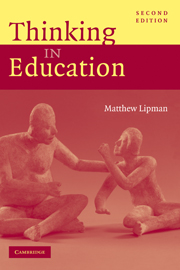Book contents
- Frontmatter
- Contents
- Preface
- Introduction to the Second Edition
- PART ONE EDUCATION FOR THINKING
- PART TWO COMMUNITIES OF INQUIRY
- PART THREE ORCHESTRATING THE COMPONENTS
- 6 The Emotions in Thinking and in Education
- 7 Mental Acts
- 8 Thinking Skills
- PART FOUR EDUCATION FOR THE IMPROVEMENT OF THINKING
- Bibliography
- Index
8 - Thinking Skills
Published online by Cambridge University Press: 05 June 2012
- Frontmatter
- Contents
- Preface
- Introduction to the Second Edition
- PART ONE EDUCATION FOR THINKING
- PART TWO COMMUNITIES OF INQUIRY
- PART THREE ORCHESTRATING THE COMPONENTS
- 6 The Emotions in Thinking and in Education
- 7 Mental Acts
- 8 Thinking Skills
- PART FOUR EDUCATION FOR THE IMPROVEMENT OF THINKING
- Bibliography
- Index
Summary
ON TEACHING THINKING SKILLS TO CHILDREN
“Thinking skills” is a catchall phrase. It ranges from very specific to very general abilities, from proficiency in logical reasoning to the witty perception of remote resemblances, from the capacity to decompose a whole into parts to the capacity to assemble random words or things to make them well-fitting parts of a whole, the ability to explain how a situation may have come about to the ability to foretell how a process will likely eventuate, from a proficiency in discerning uniformities and similarities to a proficiency in noting dissimilarities and uniqueness, from a facility in justifying beliefs through persuasive reasons and valid arguments to a facility in generating ideas and developing concepts, from the power of discovering alternative possibilities to the power of inventing systematic but imaginary universes, from the capacity to solve problems to the capacity to circumvent problems or forestall their emergence, from the ability to evaluate to the ability to reenact – the list is endless, because it consists of nothing less than an inventory of the intellectual powers of humankind. Insofar as each intelligent human activity is different, it involves a different assemblage of thinking skills-differently sequenced, synchronized, and orchestrated.
To dream of constructing a curriculum that would nurture and sharpen such an array of skills must certainly be considered quixotic: To have an impact on no more than a token selection of such skills is something we may aspire to without realistically hoping ever to achieve.
- Type
- Chapter
- Information
- Thinking in Education , pp. 162 - 194Publisher: Cambridge University PressPrint publication year: 2003



